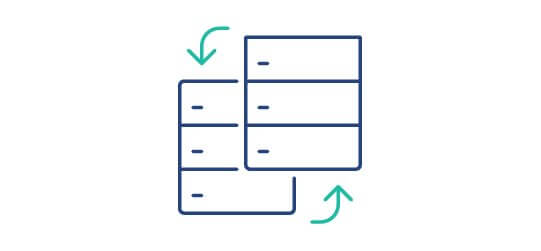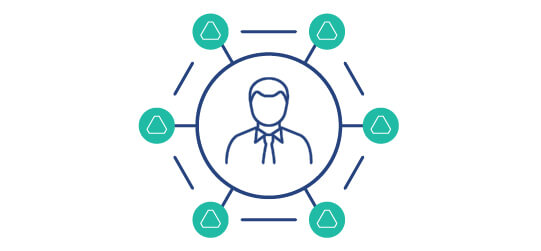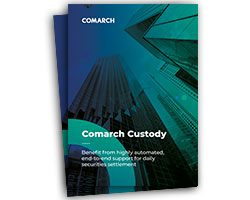 Comarch CustodyBenefit from highly automated, end-to-end support for daily securities settlement
Comarch CustodyBenefit from highly automated, end-to-end support for daily securities settlement

Comarch Custody is a modern back-office system for post-trade operations carried out by custodian banks. As a comprehensive custody software, Comarch Custody covers all functions required by custodians operating on domestic and foreign markets:
With Comarch Custody back-office system you will be able to run a back-office in a cost-effective way, providing retail and corporate clients with an A to Z service and effectively competing with other custodians on ever-changing capital markets.
SWIFT and ISO 20022 messages for a fully automated data exchange with CSDs, CCPs and clients
Multi-status chart of accounts with double entry rule, allowing for full tracking of assets under custody
Records and processing rules can be adapted to local regulations, operating models and your internal procedures
Smooth extract of data on assets and operations with the use of database views, web-services or user-defined extracts
DVP or independent financial settlement (gross or net), with booking schemes and interfaces adjusted to local regulations and financial systems in use
Hold-release, netting, partial settlement, linking and settlement tolerance leading to less risky settlement processes thanks to securities back-office system
Core financial system, client database, e-custody, market data, AML, DWH, taxation and billing interfaces for an automated data exchange in the online or batch mode
Option for global custodians with a network of branches to use the same system for processing operations on a local or global level

Clean static data is crucial for further processing and reporting of post-trade operations. The static data module stores data on:
Most data can be imported from external sources. All static data is subject to the four-eyes rule prior to use in other operations
The settlement engine creates trade records based on data from client instructions, broker files or manual entries. The validation process for each new trade includes static data check, forecasted positions in cash or securities, internal matching tolerance, settlement limits, sanctions, etc. Once a trade is validated, the preliminary or final settlement instructions are created and sent to a CSD in a proper format (SWIFT, ISO 20022 or proprietary).
Constant monitoring of trade status at the CSD allows for a prompt reaction in case of matching problems, as well as regular notifications for the end client. Trade settlement triggers automatic securities and/or cash position updates and the creation of settlement confirmation for the client. Each operation can be edited, enriched or reversed.
![]()
Our system covers a wide range of mandatory and voluntary distribution and reorganization events. Processing of corporate actions starts with a creation of a general event record based on a notification received from a CSD or other sources. Further processing can be automatic or manual for all or selected accounts. Tax agent functions allow for calculation of net payments on the record-date or ex-date basis with regard to DTT rates applicable for a particular income and client. Communication schemes create flexible rules for client notifications. Beneficial owners disclosure for omnibus accounts and proxy voting complement the full-fledged CA processing engine.
Multi-status internal chart of accounts with a double-entry rule and flexible accounting schemes enable precise asset segregation and further processing based on a trading or settled position. Intra-position asset status changes on the custodian or CSD level can be shown on the main or auxiliary chart of accounts. Fully integrated posting engine lets you track the history of all position changes. Position data can be presented in various layouts on system screens, reports and extracts. Automatic reconciliation with CSDs or sub-custodians decrease the operational risk, especially in case of multi-listed securities held at more than one safekeeping places.

A modern custody system must allow for an automated and effective processing of high volumes. It can only be achieved if the exchange of data with all relevant systems is carried out automatically. Data flows include not only client instruction processing and CSD/CCP connectivity, but also a set of interfaces to the bank’s general ledger system, e-custody portal, BI tools, market data source or central client database. Depending on the third-party system technology and functions, data exchange can be delivered as a fully automated, bi-directional online interface (web-services, JMS or MQ queues, direct database link) or as a batch mode file interface.
An integrated reporting engine allows for an automatic creation of numerous reports for clients, authorities or internal bodies. Reports can be created in your client’s language, as PDF or MS Office compatible files, or else: in a specific format required by the recipient institution or its system. All reports can be scheduled for an automated creation or generated ad-hoc. A copy of each report is stored in the system and can be retrieved for auditing purposes. If there’s a need for an ad-hoc report, business users can pair data on operations, positions and billings with the one on clients and instruments to create a dashboard panel or an extract for further processing.
Custody service is a matter of trust, reliability and security. Therefore we always integrate our custody system with a central user depository (AD, LDAP etc.) for user authentication and authorization. User rights can limit access to particular screens or functions. Four-eyes rule in static data, daily settlements and reporting combined with audit functions create an indisputable audit trail for all user actions. Secured communication, data base encryption and internal security audits let us deliver a bullet-proof custodian back-office system for the safety of your operations and your clients’ assets.
Highly customizable fee tables make it possible to setup almost every combination of rules for the calculation of settlement and safekeeping fees. Each fee table can be linked to a group of clients, so you can setup a separate fee table for each of your client segments. Out-of-pocket fee function allows you to capture a one-time fee related to extraordinary services provided by a custodian bank or an intermediary institution (e.g. broker fees or CSD fees). Periodical fee calculation, with a computation review and acceptance functions results in an automatic creation of posting records and/or invoices.
Comarch Custody is a system that follows market standards and cater to your clients in the best way possible. A wide array of functions to choose from will suit your needs regardless of your operating model, scale of operations, legal framework and IT environment. And if by any chance you feel that some areas of your custody software are not covered or need customization, do not hesitate to tell us. We’re always ready to adjust our custody system to match your requirements perfectly.

Read more about Comarch Custody
Benefit from highly automated, end-to-end support for daily securities settlement
Tell us about your business needs. We will find the perfect solution.